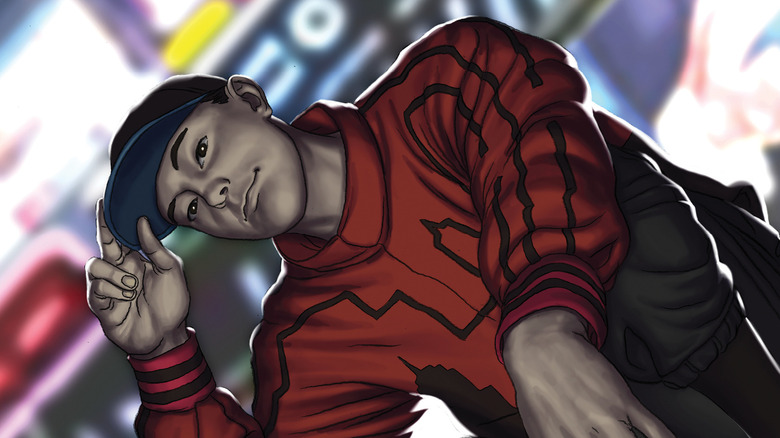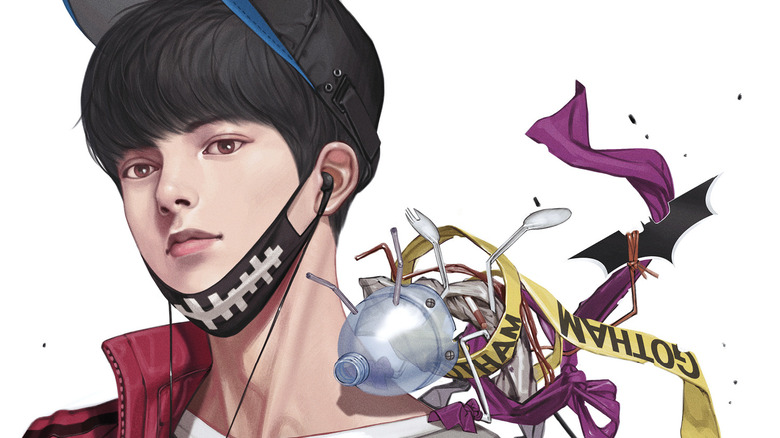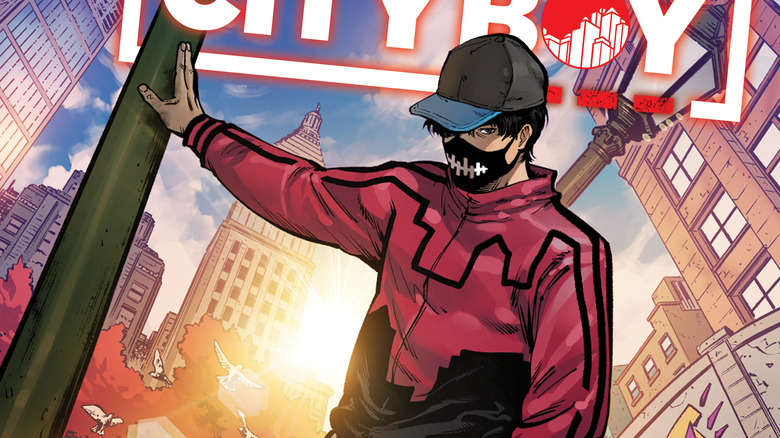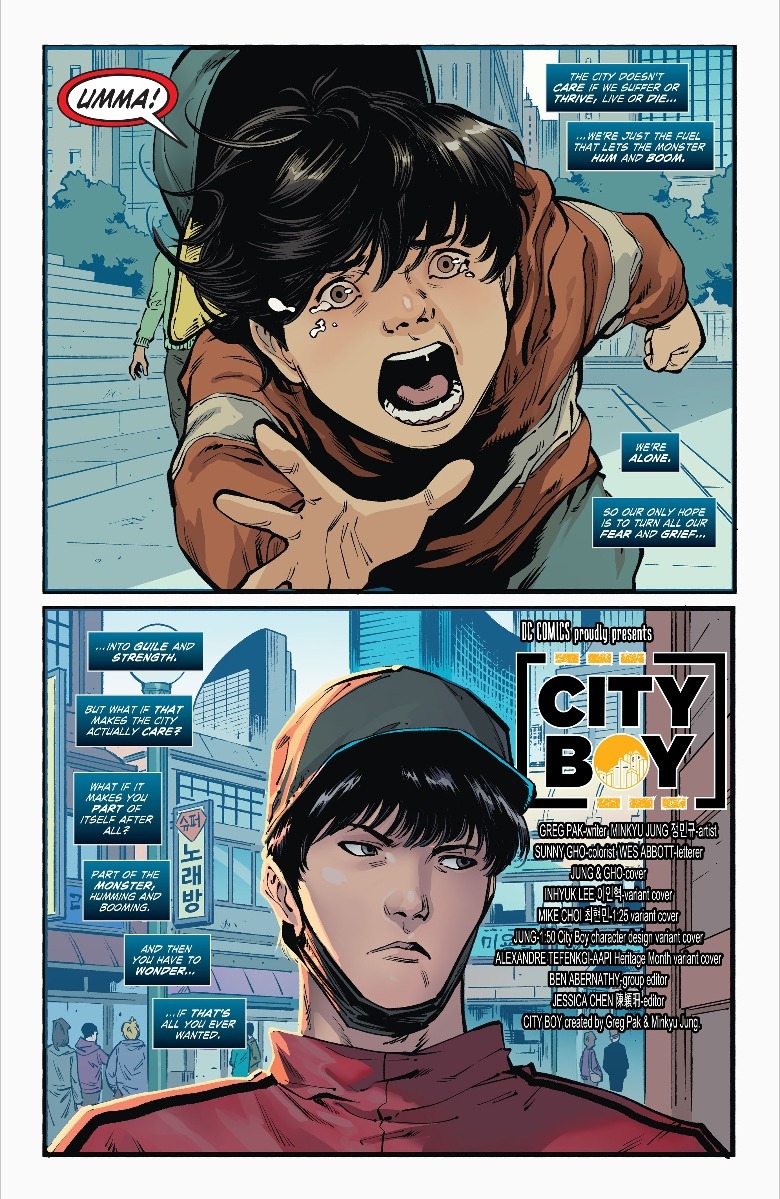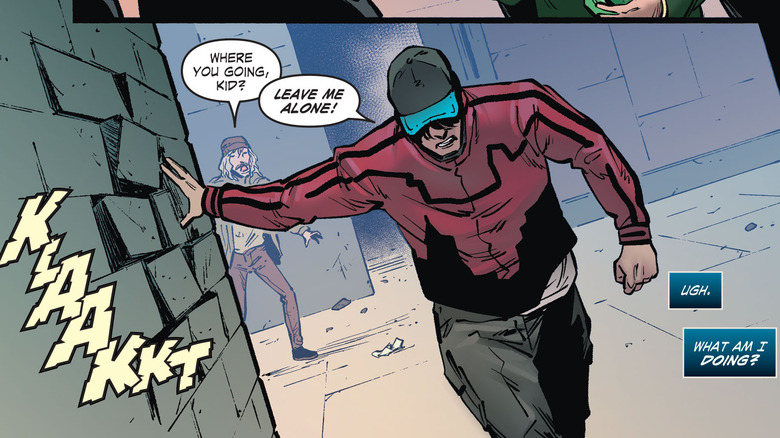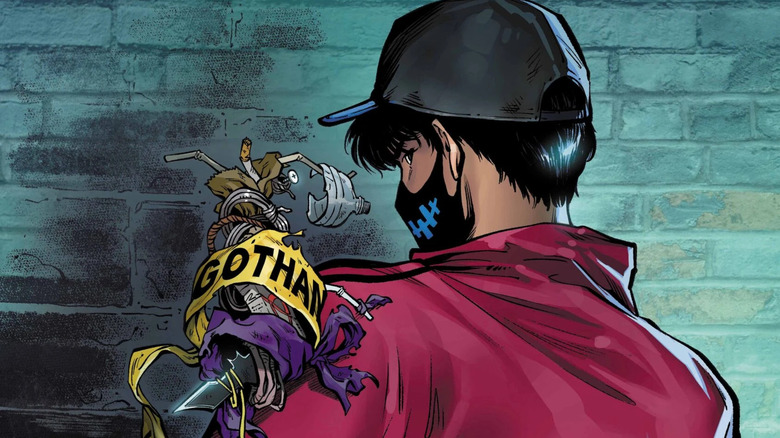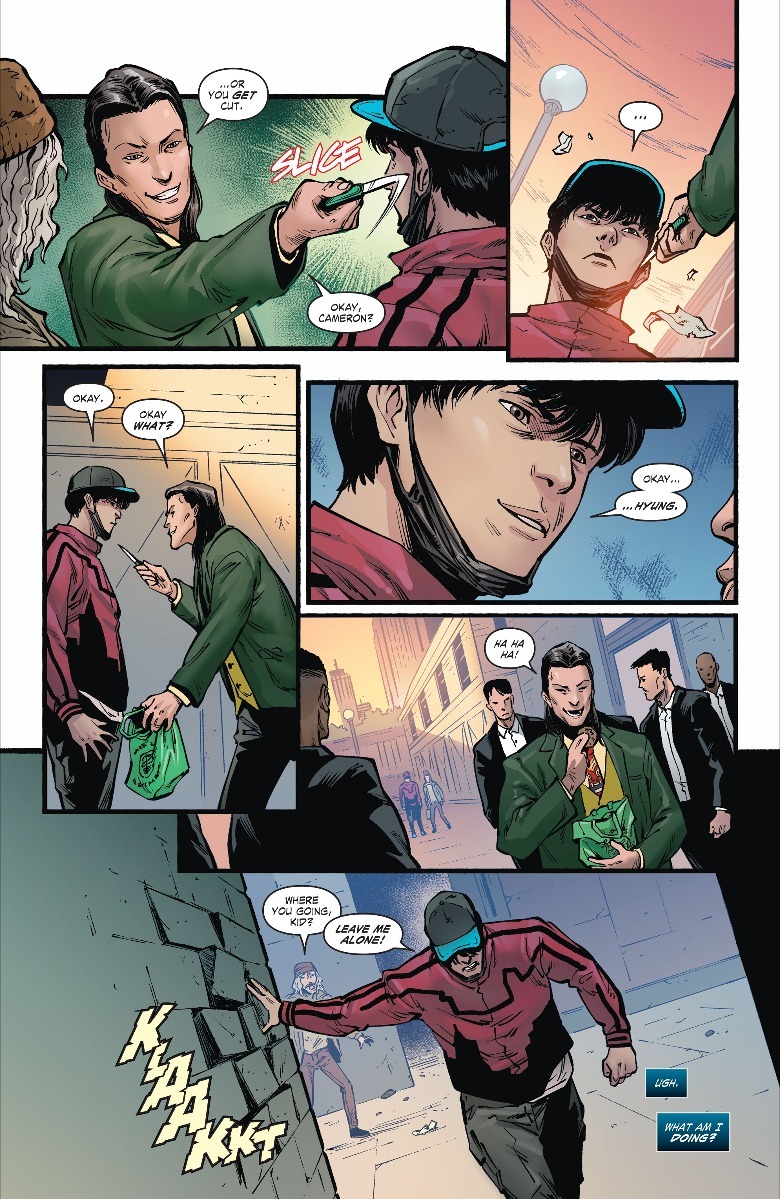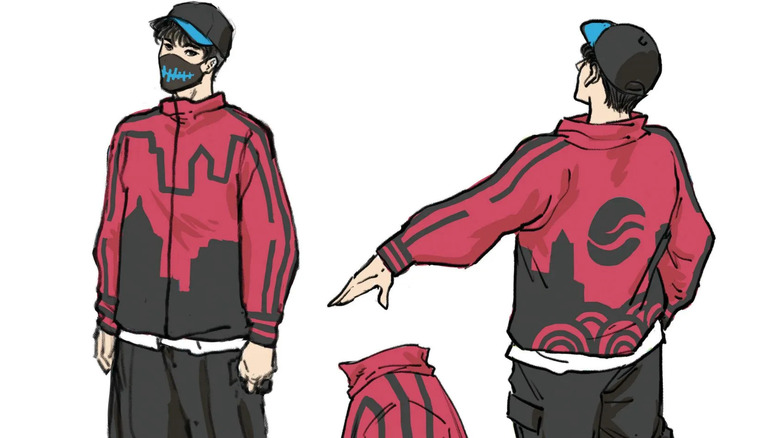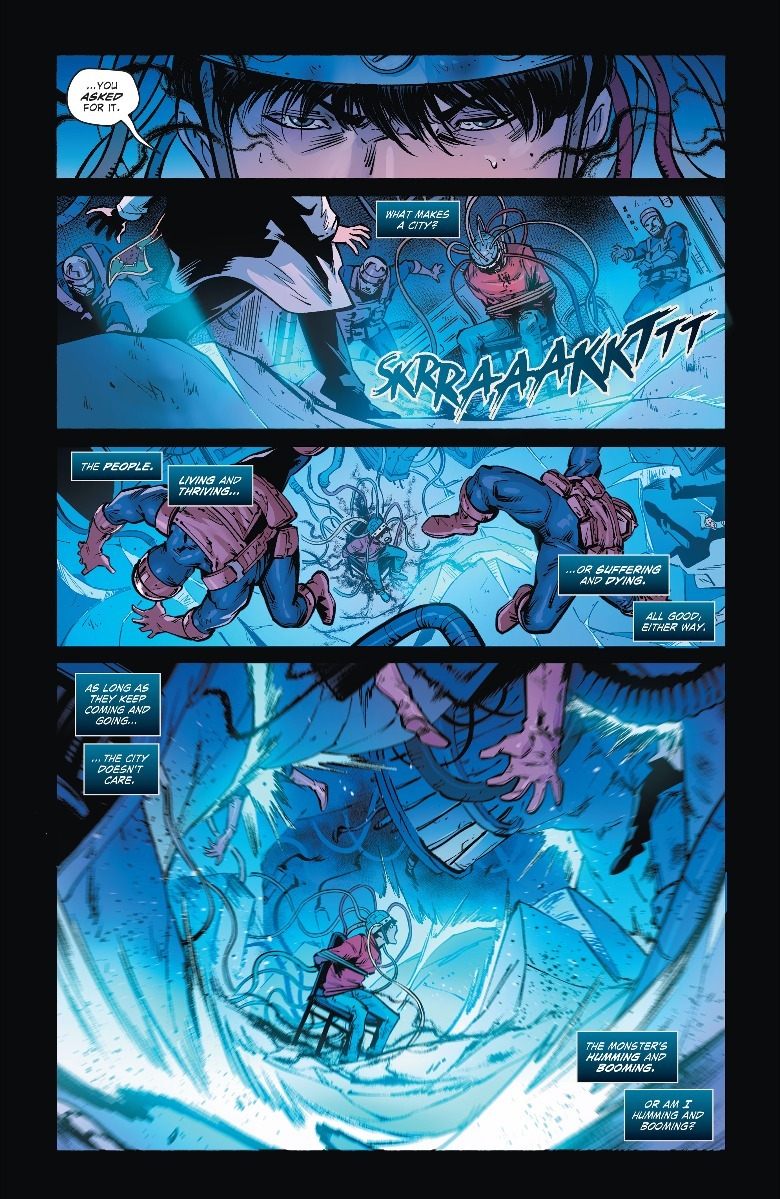Greg Pak On Bringing City Boy To The DC Universe - Exclusive Interview
DC Comics is about to give the new hero City Boy his own series as part of the new "Dawn of DC" initiative. However, Cameron Kim isn't like other heroes. With the ability to speak to cities, City Boy — who recently made his comic book debut in the "City Boy and the King of Cities" story from the "Wildstorm 30th Anniversary Special" — doesn't have the desire to save the world. Instead, he keeps a low profile while using his powers to discover hidden treasures to pawn so he can stay afloat. But despite not wanting to involve himself in the matters of those wearing capes and cowls, the Korean-born hero is about to find himself forced into action.
We spoke with writer Greg Pak about creating City Boy, developing the hero's unique powers, working alongside artist Minkyu Jung and colorist Sunny Gho on the debut issue, and what's coming next for Cameron Kim in the DC Universe and beyond.
City Boy has been in the works for a while
How did City Boy come to be? You've mentioned previously that you've had the idea for a while.
For some reason — I don't even know when I got hit with it — but for years, I've had this. I think it's from walking around New York City. I live in New York City. You walk around New York City, and if you pay attention, there's history in every little square inch of the city. You can stand on the street in New York City and look down the street, and looking at the buildings even, you can see over a hundred years of history in adjoining buildings. You've got buildings of different eras, the signage — you've got old painted signs on the sides of buildings that are fading away that represent businesses that have been gone for generations, but there's still this ghost of them.
I had this notion that somebody who was tapped into all of that, everything that this city knows ... Somebody who could know everything the city knows could be a pretty interesting thing to explore in a sci-fi or superhero book. I have this image of this kid walking down the street with the streets curling up around him, and this kid would not only know what the city knows but be able to tap into and control the city. That image had been in my head for years.
[Editor] Jessica Chen reached out to me at a certain point a couple of years ago and said that she was thinking about putting together a series of books inspired by the Milestone model, but that would feature Asian and Asian American characters. I was like, "Well, I've got this idea I've been mulling over forever, and I always thought that this could be a cool thing." She immediately dug it, and we started developing it. We pulled in Minkyu Jung, who is astounding, and a couple of years later, here we are — the first issue just about to come out.
How exciting was it to get City Boy to debut in the first two short stories and then connect him with the wider DC Universe?
It was cool. Launching any new character is a challenge. Everybody says they want new characters — "New characters, let's do it," and we all do. As creators, we love it. As readers, it's an exciting new thing. But the reality is that it is hard to put a new character out in the world and have it stick. I've been very lucky to have worked on characters over the years that have had some staying power with Amadeus Cho and Wave over at Marvel.
Having the chance to take part in those earlier anthology books and pair the character up with some established DC characters and show how this character fits into the world is a way to send a signal that this character actually matters. This character can have relationships with characters you already know and can fit into this mythology in a really interesting and vital way. We carry through on that promise with Issue 1 in a big way, so this is not only an absolutely fun, new character that's doing things you haven't seen before, but also this character fits into this big, ongoing, shared universe.
City Boy was shaped by the world around him
How is City Boy shaped by his tragic origin? Why was it important to tie his origin to the second-generation immigrant experience?
Again, living in New York ... [With] any city in the world, it feels like every big city is a place where people of all different backgrounds come together. That's a huge part of it. That immigrant experience is absolutely vital to this character, and it feels thematically vital when you're talking about cities. Even if you're not talking about immigrants, even if you're not literally talking about people from other countries coming to a city, you're talking about big cities pulling people from within the country, from other parts of the country. You got the "country mouse, city mouse" situation.
Cities are always a place where people reinvent themselves and find community or get lost. That's the other big part of it. Thematically, the book is a celebration and also a critique of this whole fantasy of the city as this thriving place of community. Because it is that way, absolutely, but it's also not. Cities will eat you alive. Cities will save you, but also destroy you, and that happens every day for millions of people. Cities are the only place a lot of people can find their community; cities are also places where people are lost.
That's also true of the immigrant experience. Not every immigrant experience is some beautiful, ascending story of joy and progress. We're all products of triumph and tragedy, and letting this book explore all of that felt right. It's interesting because I think I know what the book is about — then I keep working on it, and it's like, "Oh, it's really about this." There are always other layers to unpack.
Minkyu Jung and Sunny Gho really bring the city to life around City Boy. How much fun was it to work with them on this project?
That's all been fantastic. There are a lot of different, subtle things that are going on with this character, and a lot of choices needed to be made in terms of how you visually show all of this. At different points, this character discovers and will discover different levels to his power. Each one of those different nuances has a whole other visual component to it.
There's a very obvious thing going on with this telekinetic bond and this ability to make the city do things and make infrastructure move and shift parts of the stuff around you around. That seems fairly easy to do visually, but that's also tricky. When you are working in sequential images, they're made up of still images, so selling the idea that a character is actually moving something with their mind is like, "Is that character moving something with their mind, or is that object falling out of the sky or being thrown at them?"
You need a good visual storyteller who understands how to build that — not only panel by panel but within a frame. Smart choices have to be made all along, and Minkyu [Jung] and Sunny [Gho] are making them. Then, there's this whole thing of seeing into the city, seeing the infrastructure of the city and coming up with a consistent look for that. Sunny's got this blue glow thing going when you've got this kind of x-ray vision when you're looking into the city. All of that needs to be thought through and figured out and discussed, and I'm very lucky to be working with co-creators who are really smart and creative in finding cool ways to do all of that.
City Boy isn't like other DC heroes
Does City Boy want to be a hero? He isn't eager to put on a cape or cowl and save the day, despite wanting to do the right thing.
I wanted to play with a character who was ... He's a hustler. He's just trying to survive. You get glimpses of his background; you understand why he's like that. He is a product of a very hard, cold city, so he is trying to make it.
But at the same time, somewhere in there, there's a heart of a hero. He may be very reluctant to admit it, but there are these moments when he feels like he has to help.
It's that kind of thing where, again, this all relates to this theme of the city. When you live in a city, when you're surrounded by chaos all the time, there's a way in which even the most empathetic person is going to learn how to put blinders on to fricking walk down the street, just to make your way through life. Folks will do what they can do, but very few people are going to stop every time and save everybody who seems like they might need saving on the street. We'll call an ambulance if somebody needs help, or we'll point out when somebody drops their wallet or something like that, but to have all of your empathy turned up to a hundred every single second you're on the street would drive most people out of their mind. We are all doing the best we can to different degrees. Then, there's some folks who tune it all out because they're just trying to survive themselves.
With Cameron, he would like to be able to tune it all out and do what he needs to do. But because he has this connection to the city, he sees more than anybody else, so it's harder for him to tune all that out. It's even worse for him in the sense that he's hustling. He's finding stuff on the street that he can pawn, but if he picks something up, if he lets himself, he can start to see that thing's history and maybe find out who it truly belongs to or something. Then, he has a moral dilemma on his hands that no one else would have — and that seems unfair, but that's what happens when you have this sensitivity and power.
There's a lot of fun having a character who doesn't particularly want to always do the right thing but somehow feels like he's getting shoehorned into it. That's charming in a way, but there's something real to that — if we let ourselves open our eyes a little bit more, then maybe we'll do the right thing more often or do a little bit more. Maybe that's not such a terrible thing.
City Boy has unique powers allowing him to see what others can't
City Boy's powers are visualized through the city being a living organism. What kind of opportunities does that give you to explore sides of the DC Universe in a new way?
It's awesome because DC Comics, from time immemorial, has done an incredible job of building up cities with history and personality, and they're distinct from each other. We talk all the time about Metropolis versus Gotham, two sides of the coin and all that good stuff, just like Superman versus Batman. Those are two very distinct ways of looking at the world, and Metropolis and Gotham are two very distinct worlds. They're both sort of New York, but they're very different faces. Then, you look at other cities in the DC Universe, and they've also got different character and a different vibe. This book lets us explore that.
In our first couple issues, we're going to be in both Metropolis and Gotham. Cameron is going to have encounters with big characters in both of those locations and grapple with different ideas of what this city is about and what the city wants — if the city indeed does want something — and what his responsibilities are there.
The character becomes a really fun way to explore the DC Universe and also build and contribute to it. In our first issue, we're seeing a predominantly Asian American neighborhood in the suburbs of Metropolis on the other side of the river, which hasn't ever been seen before. There's different stuff going on there, and that's become a new venue that we can play in. In one of those backup stories, we introduced a city in the Pacific Northwest called Last Chance, so having the chance to hopefully create new cities and locations that have their own character is also part of this.
How does this book tie to the greater DC Universe?
There is a huge reveal at the end of Issue 1 that should open up a lot of doors in people's minds about where this might go. There's other stuff that's going to be revealed. When you think about ... We've got this big theme of cities, but the DC Universe has a bunch of different realms and spheres of influence — including the green, for example — so where does this all fit in within that, within this notion of different kinds of environments on the planet vying for space or dominance?
There's lots of room within this for City Boy as a point of contact for the consciousness of a living city. But that could have a lot of impact in a lot of different ways and become of interest to a lot of different, powerful characters and forces within the DC Universe. You get a hint of one of them at the end of the first issue, which makes so much sense to me. When we cracked that egg, it was like, "Of course. Look at where this entity is from, and think about what that means and how that links thematically into this." Again, I'm trying not to spoil it. But it's an endlessly rich theme that creates a lot of fun storytelling potential.
City Boy's powers allow him to have a huge role in the DC Universe
Do his powers allow City Boy to exist in any part of the DC Universe?
Yes. Well, there's some interesting stuff done. We did a team-up story with Jack Hawksmoor, who is the other big character in the DC Universe that has a connection to cities. It's a different kind of connection, as we explore in that story. Hawksmoor has different reactions to being separated from cities. Exactly how Cameron's powers will differ from that [is] also a fun thing for us to explore as time goes on.
But to your point, one of the fun things about this character is that you can stick him in any environment, and it raises interesting questions and there's something that can happen that's worth exploring and figuring out. That's solid gold. When you have a character that has a theme that can resonate in a bunch of different ways, that character might have legs — so knock on wood, we're doing our best here.
Ultimately, it comes down to emotional connection. Do we care about this dude? I sure care about him. I feel for him. I want to find out more about what happened in his past and how he's going to handle all of that conflict and trauma and make his way into the future here. I hope he resonates with readers on that emotional level as well as on this big thematic level.
How excited are you to see this book come out? What do you hope readers get from "City Boy" #1?
I hope folks will feel like they're seeing something that they haven't seen before. That's always the thrill of comics and movies. I remember years ago when I was in college, I went to the movies with a friend of mine. He was a very funny person, but as the credit started to roll, he said, "Welcome to the world of fantasy." I don't know, he was a goof, he was messing around — but there is something to that. Every time we open a book, every time we go to a movie, every time we take a shot on a new story, we want to be transported, we want to go somewhere, and we want to see something we haven't seen.
This is definitely distinct from a lot of the other stuff that I've written in the past. It's a different kind of power and story, and I hope folks take that same pleasure and are surprised and have fun with it.
"City Boy" #1 by Pak, Minkyu Jung, Sunny Gho, and Wes Abbott from DC Comics arrives in comic book stores and online retailers on Tuesday, May 23.
This interview has been edited for clarity.
